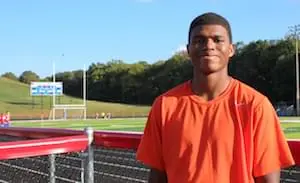Local Student Credits Adena for Getting Him Back in the Game after Concussion

 As school sports activities increase for area students during the fall, so do sports-related injuries that result in visits to urgent cares, emergency departments and provider offices. Among the many injures athletes suffer, perhaps none has earned as much national attention as concussions.
As school sports activities increase for area students during the fall, so do sports-related injuries that result in visits to urgent cares, emergency departments and provider offices. Among the many injures athletes suffer, perhaps none has earned as much national attention as concussions.
According to Adena Sports Medicine Specialist Dr. Bradley Strauch, football and soccer are the two fall sports with the highest risk for concussion. One local athlete has already experience two concussions himself, Zane Trace High School football player Etheridge Games understands the importance of proper assessment and treatment when dealing with brain health, and the healing needed to return to action.
Games’ first concussion, ironically didn’t actually occur on the field. The high school senior experienced his first head injury as the driver in a serious car accident. “Even though my concussion wasn’t sports related, my coaches and athletic trainer followed the basic concussion protocol,” explained Games. “Once I passed that, I was allowed to return to action.”
Having played football for many years, Games is well educated on concussion prevention and the seriousness of head injuries. However, the tailback says his second concussion wasn’t preventable. “Coaches can teach you how to use proper hitting techniques to help prevent injuries, but when you’re the one getting hit, it’s kind of unavoidable, as football is such a physical sport,” he said.
“The concussion protocol is a lot different now than it was when I had my first incident,” stated Games. “Before, I just had to take a series of tests and drills; and if I passed I could play. Now they make you do a lot more before releasing you, and they make you see a doctor.”
After Games’ on-field collision, he was observed by the school’s athletic trainer who recommended he go to Adena’s Saturday Morning Injury Clinic, where he could be seen by a specialist.
“I was very pleased with the care I received at Adena’s injury clinic; and Dr. Strauch, my athletic trainer and the rest of their team did a very good job assessing me and helping me get back in the game,” he said. “I was able to get in and out and seen by the doctor in a lot less time than if I would have gone somewhere else. No high school kid wants to spend their Saturday in a waiting room.”
“The Ohio High School Athletic Association recommends athletes progress through a return to play program (RTP) before being released to full game play,” explained Dr. Strauch. “The RTP process is a five-step technique spread out over five days. It is usually overseen by the school’s athletic trainer, or in a situation where there is no athletic trainer, a coach or parent. Each step should take 24 hours to ensure no return of symptoms. Sometimes athletes will feel fine after they have rested but adding back exertional activity can cause their symptoms to return.”
Strauch explains there are many risks of returning to play too soon, or while still symptomatic, including:
- A greater risk for a second concussion;
- Second impact syndrome that can result in abnormal brain blood flow, which can result in permanent disability or death if another head injury is sustained while still recovering from a current concussion;
- Increase in the severity of current symptoms, which could prolong total healing time; and
- Greater risk of additional injury, such as an ACL tear, due to alteration in balance.
Along with the RTP process, Adena providers monitor head injuries on athletes like Games with the brain health toolkit known as ClearEdge. ClearEdge provides clinicians a suite of tests and assessments to establish baselines and track brain health and wellness over time. The toolkit is comprised of separate tests for cognitive efficiency, balance assessment and symptoms tracking.
“This testing lets us continue to measure, assess and compare brain damage over the course of the student’s athletic career, allowing us to know exactly when the player is ready to get back in the game,” stated Dr. Strauch.
After being seen and observed by physicians and his athletic trainer, Games was able to get back on the field in just two weeks.
The Adena Bone and Joint Center’s Saturday Morning Injury Clinic is available during the fall to all student athleteswho may encounter an injury. ClearEdge testing is available to all athletes at any time, and is highly recommended prior to any sustained head injury to establish a baseline reading.
Where: Adena Bone and Joint Center
4437 State Route 159
Suite G15 Chillicothe, OH
When: Every Saturday
August 25 - October 27
9 - 11 a.m.
For more information about Adena Sports Medicine’s Saturday Morning Injury Clinic, call 740-779-4598.
If you have any questions about an injury, call the Adena Sports Medicine hotline at 740-779-8943 or email adenasportsmed@adena.org.